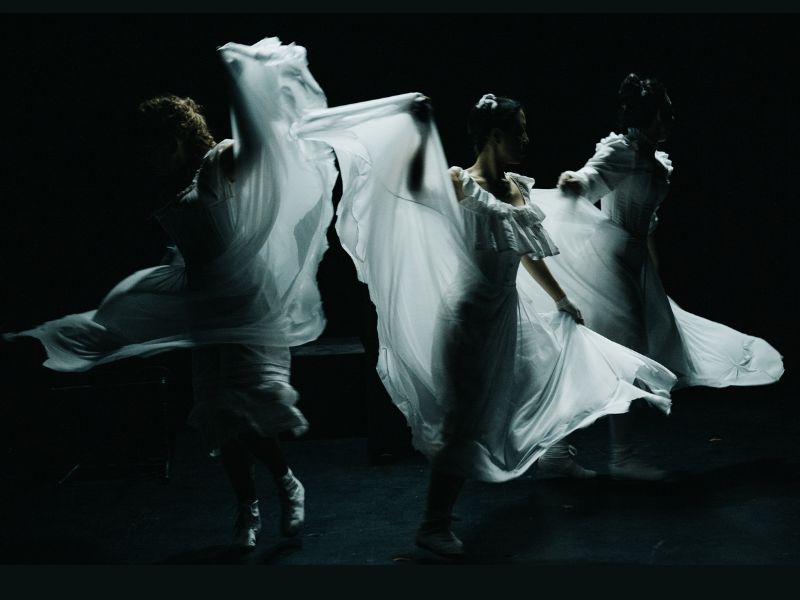I am woman, hear me roar
In numbers too big to ignore
—“I Am Woman”
Helen Reddy’s 1972 hit “I Am Woman” doesn’t appear in La Salpêtrière — Kelsey Mesa’s sensationally savvy new play about uppity women branded as hysterics — but the song’s theme of feminist resistance hums like an undertone throughout. Over the course of 90 captivating minutes in the play’s surprisingly funny world premiere at Taffety Punk, three women consigned to a 19th-century asylum for hysterics are put through their patriarchal paces by a cocky male shrink until finally they revolt. By literally roaring.

Hysteria as a diagnosis has been a cudgel for pathologizing women since long before Freud, as far back as the Greeks, who first identified the uterus as the site of female anxiety, irritability, and other ills. Mesa shrewdly makes this diagnosis the centerpiece of her satiric dark comedy, which she sets in La Salpêtrière, a notorious Paris hospital for hysterics named after a factory that made saltpeter (gunpowder). As Le Docteur, the play’s tweedy arbiter of sanity, Danny Puente Cackley exudes smug chauvinist charlatan as he ticks off an absurd list of symptoms, names notable women who have succumbed, and explains to his female charges:
LE DOCTEUR: …You see. If we only accepted how sick all of these women — all of you women — have been with hysteria, we would have a better understanding of our world. We would understand why poor Eve tasted that apple. If we understood all of that, we’d have better control over the world. Or, we would, the men. But you women would feel much better.
Though hysteria as a diagnosis has been thoroughly debunked, the misogyny it was a carrier for is alive and well, and one of the many rewards of Mesa’s script is the witty way it reflects and deflects everyday diminishments and derision. The satisfaction is in the exhilaration of recognition.
The setting of La Salpêtrière functions as metaphorical confinement, much like that of Sartre’s No Exit. The black walls in the black box at Capital Hill Arts Workshop are streaked with the fingernail claw marks of patients desperate to escape. The three we meet — Antoine, Didi, and Yvette — are figuratively trapped in a world made by men. Le Docteur manipulates and dominates them as does Pozzo Lucky in Godot. The cast is small but the symbolism is immense, and Mesa’s fiery script combusts like … gunpowder.
We first see the three patients in period white dresses dancing as if having a fake fit, and then they come to their senses and become fascinatingly differentiated. Kimberly Gilbert as Antoine brings her distinctively droll comic talent to a character who comes from wealth, takes no guff, and now and then takes a puff. If there’s funny to be found, she’s on it.
Yihong Chen as Didi, who in her past was paid by men for sex, plays a dancerly character who dotes on Le Docteur and fancies herself his star hysteric, begging him to pick her to be exhibited in the sideshow demonstrations he gives as lectures. If there’s fawning to be done, she’ll do it.
The character whose story arc is most unexpected is Yvette, played by Fabiolla da Silva with striking vulnerability and startling strength. As the new arrival, Yvette cries out for her husband, Charles. She doesn’t believe she belongs here, she protests — there’s been a mistake; she’s not a hysteric. We learn, however, that she may have murdered Charles with her bare hands. And as she is told by Antoine, if she did, she will need to stay in the asylum as a hysteric in order to get out of going to jail as a convict. The scene when we find out Yvette’s truth is a knockout. If there is fear to be felt, she’s got it.
Danielle A. Drakes directs the performance in an assured style that modulates the play’s moment-to-moment emotions compellingly; and intimacy, fight, and movement director Lorraine Ressegger-Slone achieves gestural imagery at times jolting.

The production values serve the story exceedingly well: Marcus Kyd’s haunting sound design of music and effects, Elijah Thomas’ eye-popping lighting, Johnna Presby’s elegantly detailed white costumes, Daniel Flint’s resourceful all-black set pieces. The facility is small but the theatricality is immense, and the show’s originality and subversive substance make it a must-see.
Taffety Punk cofounder and artistic director Marcus Kyd told the opening night audience that the company and company member Kelsey Mesa have been developing La Salpêtrière since COVID. The result is a testament to the alchemy of collaboration: A script that has begun nurtured by a locally grown amalgam of artists is now ready to be staged in venues far beyond.
Running Time: Approximately 90 minutes with no intermission.
La Salpêtrière plays through October 14, 2023, presented by Taffety Punk Theatre Company performing at the Capitol Hill Arts Workshop, 545 7th Street SE, Washington, DC. Purchase tickets ($15 each) online.
La Salpêtrière
Playwright: Kelsey Mesa
Director: Danielle A. Drakes
CAST
Kimberly Gilbert (Antoine)
Fabiolla da Silva (Yvette)
Yihong Chen (Didi)
Danny Puente Cackley (Le Docteur)
PRODUCTION
Lighting Design: Elijah Thomas
Costume Design: Johnna Presby
Intimacy, Fight, and Movement Director: Lorraine Ressegger-Slone
Scenic and Props: Daniel Flint
Sound Design: Marcus Kyd
Dramaturgy: Tiffany Bryant
Stage Manager: Jenna Keefer
Assistant Stage Managers: Carrie Edick, Tattenda Rameau
Vocal Coach: Teresa Spencer
Production Assistants: Jamie Lapierre, Grayson Moreno, Lise Bruneau, Emi Erickson, Barbi Broadus
Poster Art: Ryan Carroll Nelson
Managing Director: Erin Mitchell Nelson
SEE ALSO:
‘It’s obscene but true’: Kelsey Mesa on her terrifying new play, ‘La Salpêtrière’ (interview by Ravelle Brickman, September 22, 2023)





Great review. I look forward to seeing the play this Saturday!